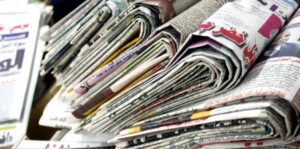Sudan journalists: ‘Al Bashir regime tightening grip on press’
The ruling regime in Sudan under President Omar Al Bashir has “continued to tighten its grip on newspapers and journalists” in the wake of public protests and uprisings that have dominated the news for the last three weeks.

The ruling regime in Sudan under President Omar Al Bashir has “continued to tighten its grip on newspapers and journalists” in the wake of public protests and uprisings that have dominated the news for the last three weeks.
In a statement yesterday, the Sudanese Journalists’ Network decried “the continued punitive measures and reprisals against the press and journalists calling on Al Bashir step down.”
“A number of journalists have been brutally assaulted and insulted by officers of the National Intelligence and Security Service (NISS) for no reason other than carrying out their professional duty to cover peaceful protests. They were detained and released after hours.”
Journalists targeted
The statement said: “The attacks have been systematic and clearly targeted the journalists, while the authorities must issue clear and binding directives to the forces to facilitate their tasks and enable them to access the scene of the event”.
According to the statement, the journalists who were shortly detained were Ahmed Younes, correspondent of The Middle East newspaper in Sudan, Mohamed Amin, a correspondent working for the Bloomberg agency, Abdelrahman Jabur of El Akhbar daily, who was hit by a tear gas canister in his back, Sarah Deifallah, Shakir Mukhtar, who is El Wifag correspondent in Wad Madani in El Gezira, and Saleh Ahmed in Port Sudan. “All of their mobile phones were confiscated to erase images and information about events and to access their secrets documents in clear violation of privacy.”
Continued detention
The network further strongly condemned the continued detention by the NISS of colleagues Kamal Karrar and Gurashi Awad from El Midan newspaper, Ismail Bilal, news reporter for the Northern State TV Channel, and Darfuri journalist Omar Juma without any explanation.
The network holds the security apparatus responsible for their security and safety.
The network’s statement also pointed to the arrest of journalist Mohamed Hamid who was covering the demonstrations. He has been stopped from working on Sudan TV because he presented video clips on his Facebook page of the events of 25 December.
The network also pointed to the security apparatus arrest of media professionals Khalifa Kusheib and Abdelmajid Hasan working for the East Darfur Radio. They were summoned by NISS officers during the past few days because of their writings in social media and their solidarity with the popular movement.
Gagging
The statement added that the security apparatus is still gagging Saadeldin Hasan, correspondent of Al Arabiya Channel in Khartoum. He was repeatedly summoned by the NISS and questioned for long hours, in order to prevent him from appearing on the channel. “He did not commit a crime other than doing his duty and reflecting the reality transmitted by correspondents and the rest of the channels”.
The network condemned the continued targeting of El Jareeda newspaper, which is being confiscated almost daily and prevented from publishing, in addition to preventing the printing of El Midan newspaper on Tuesday.
The Sudanese Journalists’ Network rejected these persistent and escalating violations and called on journalists to unite and escalate peaceful means in defence of the honour of the profession and the protection of freedom of opinion and expression and press freedoms.
It stressed that it would expose these violations and make public the security plan aimed at intimidating and silencing the mouths of journalists and terrorising them.
Press curbs
The National Intelligence and Security Service (NISS) has launched a frantic campaign against the press and imposed a strict prior-publication censorship, monitoring the content of daily newspapers and mainly focusing on El Tayyar and El Jareeda. It has, among others, prevented the two dailies from covering the protests by turning the printing presses into barracks for the security service or military, and the entire print-run of El Jareeda has been repeatedly confiscated.
On December 27, Sudanese journalists embarked on a three-day strike in response to peaceful demonstrations and protests across the country, protesting the authorities’ continued crackdown on press freedom and expression, and the arrest of a number of journalists.
Reporters Without Borders
International press freedom watchdog Reporters Without Borders (RSF) has issued a statement voicing its alarm at “a new crackdown on the Sudanese media, which has included arrests, attacks on journalists, publication bans and internet cuts. The crackdown has been prompted by a nine-day-old wave of anti-government protests that were triggered by food and fuel price hikes”.
RSF points out that the NISS has done everything possible to prevent journalists from covering the protests, in which 19 people have been killed in clashes with the security forces, according to the authorities – and at least 37, according to Amnesty International.











 and then
and then